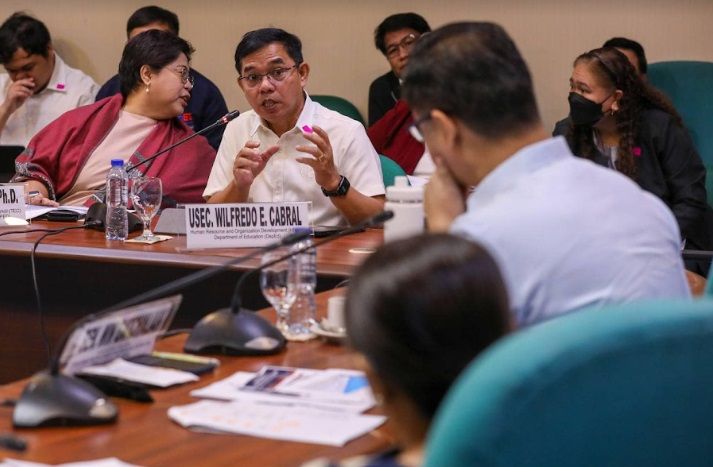Philippines lagging in teacher career progression, says DepEd official
EDCOM 2 pushes for institutionalizing the teacher career progression system
An official from the Department of Education (DepEd) stated on Tuesday, Oct. 22, that the country faces challenges regarding career progression for teachers.

“Based on our study as well, in the Philippines, we are the best in entry level salary grades but we are being left out by other countries in terms of progression,” said DepEd Undersecretary Wilfredo Cabral during a Senate hearing discussing bills on the Expanded Career Progression System for Public School Teachers.
Cabral noted that the Philippines’ lagging career progression affects teachers' motivation and job satisfaction. “So if this can happen now, we can change something for our teachers,” he explained.
He added that the provisions stipulated in the proposed bills are “consistent and aligned with what we envision for the next 10 to 15 years.”
“This is the demand of the present time,” Cabral said.

The public hearing discussed bills filed by Senator Jinggoy Estrada, Representative Yedda Romualdez, and Second Congressional Commission on Education (EDCOM 2) Co-Chairpersons Senator Win Gatchalian and Representative Roman Romulo, along with Commissioners Senator Loren Legarda and Representative Jude Acidre.
Focus on teachers
During his opening statement, Gatchalian underscored the need to identify career paths for teachers.
“Improving morale involves more than remuneration; it also includes career progression, skill enhancement, and increased mobility in their careers,” Gatchalian said. “We hope to see teachers recognized as leaders in the education system,” he added.
DepEd, EDCOM 2, and other stakeholders are advocating for the institutionalization of the Teacher Career Progression System, aiming to address long-standing challenges in teacher promotion and career development.
EDCOM 2 findings reveal that the current career progression system is hindered by a lack of available plantilla positions in schools and school division offices.
Although many teachers and school leaders meet the qualifications for Master Teacher roles, promotion opportunities remain limited due to the scarcity of available positions, EDCOM 2 pointed out. This constraint has stifled professional growth and career mobility for educators throughout the education sector.
Addressing challenges
EDCOM 2 noted that a quota system, as stipulated under the Position Classification and Compensation Scheme (PCCS) (DBM Manual on PCCS, Chapter 6, 2004), further “exacerbates the issue.”
According to EDCOM 2, Master Teacher positions in elementary schools are limited to 10 percent of the total teacher positions, with 6.6 percent allocated for Master Teacher I and 3.4 percent for Master Teacher II.
It also noted that secondary schools face similar limitations, allowing for one Master Teacher position per subject area for every 5 to 7 authorized Teacher I to III positions.
EDCOM 2 Chief Technical Officer Krupskaya Añonuevo noted in her presentation that data shows it takes an average of 15 years for a teacher to progress from Teacher I (Salary Grade 11) to Teacher III (Salary Grade 13).
“With limited career advancement options, many teachers are forced to shift into administrative roles, such as head teachers, to secure higher pay,” she added.
Institutionalizing career progression
In July, DepEd Secretary Sonny Angara, who previously served as a commissioner on EDCOM 2, signed the implementing rules and regulations (IRR) for Executive Order 174, which created an expanded career progression system for public school teachers within the Department.
Añonuevo emphasized that, despite the existing IRR for EO 174, there is a need to institutionalize the Expanded Career Progression System.
“We want to send a strong signal to our classroom teachers that if they wish to remain in the classroom and master teaching, they can do so and advance in their careers,” she added.
During the hearing, resource persons advocated for the stronger institutionalization of the system through the enactment of a legislative measure.
The House of Representatives has approved House Bill 10270 on its third reading and is now awaiting action on the corresponding measure in the Senate.
Teacher Education Council (TEC) Executive Director Jennie Jocson also expressed her support for the measure.
“The bills we are discussing support RA 11713 (Excellence in Teacher Education Act) concerning the affirmation of career stages,” Jocson said.
“The important part of the bills is the inclusion of the supervisor in the administration track, which the Council views as completing the cycle for our teachers and school leaders,” she added.